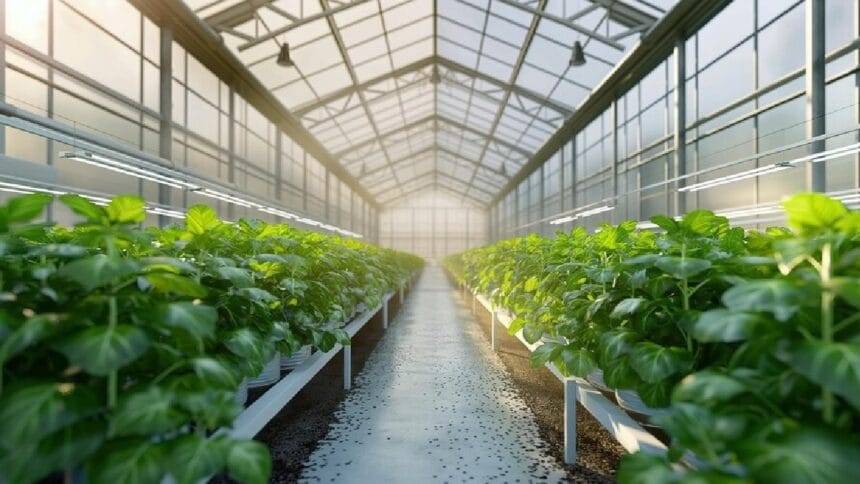Main Points In Hindi (मुख्य बातें – हिंदी में)
-
सतत कृषि में सहयोग: भारत और नीदरलैंड सतत कृषि के क्षेत्र में एक-दूसरे के साथ सहयोग बढ़ाने की योजना बना रहे हैं। दोनों देशों के सरकारी स्तर पर इस दिशा में प्रयास तेज किए गए हैं, जिसमें ‘सीड सेक्रेटेरियट’ के माध्यम से कृषि में सहयोग किया जाएगा।
-
नई कृषि तकनीकें: नीदरलैंड के उप कृषि मंत्री, जंकिस गोयट ने ‘सर्कुलर प्रोडक्शन’ तकनीक का परिचय दिया, जो जल बुद्धिमानी से उपयोग करने के लिए विकसित की गई है। यह तकनीक जल स्तर में गिरावट को रोकने में मदद करेगी, जिससे कम क्षेत्र में अधिक उत्पादन संभव हो सकेगा।
-
संयुक्त कार्य योजना: दोनों देशों ने कृषि क्षेत्र में एक संयुक्त कार्य योजना तैयार की है, जिसमें बीज उत्पादन, नए बीजों का विकास, कृषि रसायनों का कम उपयोग और किसानों की आय में सुधार पर ध्यान केंद्रित किया गया है।
-
जलवायु परिवर्तन से निपटना: गोयट ने बताया कि नीदरलैंड जलवायु परिवर्तन से निपटने के लिए 2030 तक ग्रीनहाउस गैस उत्सर्जन को 55 प्रतिशत कम करने का लक्ष्य रखता है। इसके लिए कृषि में जलवायु अनुकूल फसलों के विकास पर बल दिया जा रहा है।
- केंद्रों की स्थापना: भारत और नीदरलैंड मिलकर कृषि शिक्षा और प्रशिक्षण के लिए ‘सेंटर्स ऑफ एक्सीलेंस’ स्थापित कर रहे हैं। वर्तमान में आठ ऐसे केंद्र हैं, जिनकी संख्या भविष्य में बढ़ाई जाएगी, ताकि किसानों को बीज विकास, मिट्टी प्रबंधन और जल प्रबंधन के बारे में जानकारी दी जा सके।
Main Points In English(मुख्य बातें – अंग्रेज़ी में)
Here are the main points from the article regarding the cooperation between India and the Netherlands in sustainable farming:
-
Increased Cooperation in Sustainable Farming: India and the Netherlands are intensifying their collaboration in sustainable agriculture through initiatives such as the ‘Seed Secretariat’, aiming to share knowledge and technology.
-
Centers of Excellence and Farmer Education: Both countries are establishing centers of excellence to provide education and training to farmers, with a focus on improving yields and sustainable farming practices.
-
Circular Water Production Technology: The Netherlands introduced innovative irrigation technology called ‘circular production’, designed to conserve water by recycling water from homes to greenhouses for crop irrigation, addressing the common issue of groundwater depletion.
-
Joint Action Plan: A collaborative action plan has been developed to address various agricultural challenges, such as the wise use of pesticides, seed production, and increasing farmer incomes through sustainable practices.
- Climate Change Mitigation: The Netherlands aims to reduce greenhouse gas emissions by 55% by 2030, focusing on the development of climate-friendly crops and transitioning to geothermal energy in greenhouse farming to minimize emissions.


Complete News In Hindi(पूरी खबर – हिंदी में)
भारत और नीदरलैंड एक दूसरे के साथ टिकाऊ कृषि में सहयोग बढ़ाने जा रहे हैं। इस संबंध में दोनों देशों की सरकारों ने प्रयासों को तेज़ किया है। यह जानकारी नीदरलैंड के उप कृषि मंत्री जंकिस गॉयट ने लखनऊ में दी। उन्होंने ‘टाइम्स ऑफ इंडिया’ को बताया कि दोनों देश ‘सीड सचिवालय’ के माध्यम से कृषि के क्षेत्र में अपनी सहयोग को बढ़ा रहे हैं। दोनों देश एक-दूसरे की मदद से कृषि के लिए उत्कृष्टता केंद्र खोल रहे हैं। इसके अलावा, किसानों को उच्च उपज के लिए कृषि शिक्षा और प्रशिक्षण दिया जा रहा है।
गॉयट ने नई तकनीक ‘सर्कुलर प्रोडक्शन’ के बारे में जानकारी दी, जो पूरी दुनिया के लिए नई है। यह तकनीक सिंचाई में उपयोग होती है। गॉयट ने कहा कि जैसे भारत में भूजल कम हो रहा है, उसी तरह नीदरलैंड में भी यह तेजी से गिर रहा है। उनके देश का आकार छोटा और जनसंख्या घनी है। इसलिए, कम क्षेत्र में अधिक कृषि करना ही एक समाधान है। सर्कुलर वॉटर प्रोडक्शन तकनीक का उपयोग पानी का सही तरीके से इस्तेमाल करने के लिए किया गया है। इसमें घरों से या अन्य स्थानों से पानी को ग्रीनहाउस में भेजा जाता है, जिससे फलों और सब्जियों की सिंचाई की जा सके।
दोनों देशों का कार्य योजना तैयार
दोनों देशों ने कृषि के क्षेत्र में एक संयुक्त योजना बनाई है। इस योजना के तहत दोनों देश कई क्षेत्रों में सहयोग कर रहे हैं, जिसमें नवाचार, कीटनाशकों का विवेकपूर्ण उपयोग, कृषि में रासायनिक उपयोग को कम करना, बीज उत्पादन, नए बीजों का विकास और टिकाऊ कृषि पद्धतियों के माध्यम से किसानों की आय बढ़ाना शामिल है। दोनों देश इन मुद्दों पर अपनी कार्य योजना पर काम कर रहे हैं।
गॉयट ने कहा कि जलवायु परिवर्तन के मद्देनज़र कृषि उत्पादन बढ़ाने और खाद्य सुरक्षा सुनिश्चित करने के लिए किसानों को अच्छे बीज उपलब्ध कराना जरूरी है। इसके लिए बीजों का विकास बहुत महत्वपूर्ण है। इसी को ध्यान में रखते हुए, इस हफ्ते भारत और नीदरलैंड ने एक समझौते पर हस्ताक्षर किए हैं, जिसमें नए बीजों के विकास पर अधिक जोर दिया गया है। भारतीय किसानों को मिट्टी को बनाए रखने और जल प्रबंधन के तरीके भी सिखाए जाएंगे। इसके लिए उत्कृष्टता केंद्र खोले जाएंगे। वर्तमान में ऐसे 8 केंद्र हैं, जिन्हें भविष्य में बढ़ाया जाएगा।
जलवायु परिवर्तन के खिलाफ तैयारी
जब गॉयट से पूछा गया कि नीदरलैंड जलवायु परिवर्तन से निपटने में कैसे भाग लेंगा, उन्होंने कहा कि लक्ष्य 2030 तक ग्रीनहाउस गैसों के उत्सर्जन को 55 प्रतिशत कम करना है। इसमें कृषि मुख्य भूमिका निभाएगी, इसलिए जलवायु मित्रवत फसलों के विकास और खेती पर जोर दिया जा रहा है। ग्रीनहाउस खेती का उपयोग किया जा रहा है, लेकिन इसमें ग्रीनहाउस गैसों का खतरा है। पहले ग्रीनहाउस को गर्म रखने के लिए प्राकृतिक गैस का उपयोग किया जाता था, लेकिन अब इसके स्थान पर भू-तापीय ऊर्जा का उपयोग किया जाएगा। इससे ग्रीनहाउस गैसों के उत्सर्जन को कम किया जा सकेगा।
Complete News In English(पूरी खबर – अंग्रेज़ी में)
India and Netherlands are going to increase each other’s cooperation in sustainable farming. Efforts have been intensified at the government level in both the countries regarding this. This information was given by the Deputy Agriculture Minister of Netherlands in Lucknow. His name is Jankis Goyat. Giving information about this in Lucknow, Goyat told ‘Times of India’ that both the countries are increasing their cooperation in the field of agriculture through ‘Seed Secretariat’. Both countries are opening centers of excellence in farming with each other’s help. Besides, farmers are being given farming education and training to get higher yields.
In the conversation, Netherlands’ Deputy Agriculture, Food Security, Fisheries and Nature Minister Goyat gave information about new technology like ‘circular production’. This technology is completely new for the whole world. This technique is used in irrigation. Regarding this, Goyat said that just as groundwater is depleting in India, similarly its level is falling rapidly in the Netherlands too. Their country is small and dense too. Therefore, there is no other solution except doing more farming in less area. Circular water production technology has been introduced to use water wisely. In this, water from home or other places is sent to the greenhouse and fruits and vegetables are irrigated.
Action plan of both countries ready
Both the countries have prepared a joint plan in the field of agriculture. Under this plan, both the countries are cooperating in many areas. This includes innovation, wise use of pesticides, reducing the use of chemicals in farming as much as possible, seed production, development of new seeds and increasing farmers’ income through sustainable agricultural practices. Both the countries are working on all these issues in the action plan.
Also read: Success Story: Started organic farming in greenhouse, now earning lakhs by growing cucumber
On the question of how to increase agricultural production and ensure food security keeping in mind climate change, Goyat said that for this it is necessary to provide good seeds to the farmers. For this, development of seeds is very important. Keeping this in mind, this week India and Netherlands have signed an MoU in which the maximum emphasis is on the development of new seeds. Indian farmers will also be told how to maintain soil and manage water. Consumers also have to be made aware on the use of agricultural products for which Centers of Excellence will be opened. At present the number of such centers is 8 which will be increased in future.
Preparation against climate change
On the question of how the Netherlands will participate in tackling climate change, Goyt said that the target is to reduce greenhouse gas emissions by 55 percent by 2030. Agriculture will play the biggest role in this, hence emphasis is being laid on developing and cultivating climate friendly crops. Greenhouse farming is being used in this but there is a danger of greenhouse gases in it. Till now natural gas was used to keep the greenhouse warm, but now geothermal energy will be used in its place. This will reduce greenhouse gas emissions.
Also read: Trend of polyhouse farming increasing in Bengaluru, farmers are taking full advantage of this subsidy scheme.








